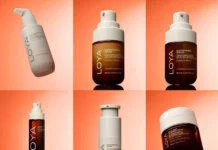“I’m just going to spread some muck on my face before my beauty sleep.”
How true!
Beauty rituals are now rooted not only in restoring skin lustre, promoting skin elasticity, and healing the body, but also in restoring soil health, promoting biodiversity, and healing the land.
Our faces and bodies require more than just beneficial ingredients. They require reduced greenhouse gas emissions and water system retention. They must not just hydrate us, but also hydrate the world.
Regenerative agriculture is revolutionizing the skincare industry, guaranteeing ingredient quality and environmental responsibility, and transparency. We look at ourselves in the mirror and smile, seeing cover cropping, minimal tillage, good composting practices, and carbon capture. We see the worms and other heroes at work.
Well-nourished skin comes from well-nourished soil. We can see and feel mature sheep, nettles, and macerated horsetail that have fertilized the vineyards, vegetable gardens, and herb fields.
Soil health helps skin health. And vice versa.
A healthier, more resilient ecosystem means a healthier, more resilient you. Good land care is inextricably linked to good skincare.
Says Tuscany-based Seed To Skin founder Jeanette Thottrup: “Conventional crops now hold less than a quarter of nutrients today than they did 50 years ago. Intensive monocrop farming clearly depletes the soil. Without soil health, you don’t have any powerful nutrients in your botanicals for formulations.”
Plants grown in nutrient-rich soil are packed with beneficial compounds with higher concentrations of antioxidants, vitamins, and phytonutrients, which translates into more effective skincare products.
Brands like Farmacy, FaTH, and Tata Harper have recognized the synergy between skin and soil. They source ingredients from regenerative farms. YSL Beauty and Dior invest in ecosystem restoration and convert their signature gardens to regenerative practices. Unilever has implemented regenerative principles across its supply chain.
“Natural” farming methods reduce chemical residues in skincare ingredients, making products safer for sensitive skin. A larger range of botanicals is accessible. Everything from anti-inflammatory calendula and olive oil to antioxidant-rich pomegranate, allowing for more innovative and targeted skincare solutions.
The dangers of processed food are well-known. The connection between farming and beauty is being better understood.
Increased crop rotation means decreased breakouts!
According to Farmacy, farm-to-face beauty is one-of-a-kind ingredients straight from the source, using purer, fresher, small batch products harvested and delivered to your skin without the use of harmful chemicals or long transport journeys.
Farmacy all began with the discovery of a rare green echinacea (cone flower) in an upstate New York garden. It was found to have 300% more natural antioxidants than regular echinacea. And patented as GreenEnvyEchinacea. All the brands’ ingredients are locally grown and locally produced.
Japan boasts Giselle Go and Philippe Terrain’s planet-positive Dam Dam. Its ingredients are 100% natural origin, with heroes such as rice and shiso regeneratively farmed in Japan.
South Australia has Jurlique, founded by biochemist Dr Jurgen Klein. It has its own farm, which relies on organic farming methods free from pesticides, chemicals, and herbicides, to produce soil that is unpolluted and rich in natural ingredients.
We are fighting skin-damaging environmental pollutants with non-polluted ingredient supply chains.
With the majority of beauty consumers now prioritising sustainability and targeting eco-friendliness, farm-to-face brands tick all the boxes.
Says Apinke Efiong, founder of EKO Botanicals: “Ingredients sourced from regeneratively farmed land carry the vibrancy of healthy ecosystems. Untouched by harmful pesticides, these ingredients embody the purity and vitality that our skin craves.”
A financier-turned-florist-turned skincare brand owner, her great-great-grandfather was a botanist at the Royal Botanic Garden, Kew in the UK. “Creating my own high-performing skincare formula, I work with only the highest quality of plant oils and extracts that contain the most dense potency of nutrients possible. I then combine these with carefully selected plant actives for optimal efficacy to address the needs of maturing skin without using synthetic ingredients.”
The practice of rehabilitating and strengthening degraded soil and ecosystems is changing the face of the clean beauty landscape.
With products like Seed to Skin’s The Golden Dew, Furtina Skin’s Cielo Pure Cleansing Oil Balm, Tata Harper Supdrkind Bioshield Face Oil, and Beauty Thinkers Boost Oil.
Beauty Thinkers is based in Tuscany. Co-founder Claudio Castiglioni’s regenerative farm became the first farm in the world to be certified as zero CO2 emissions. He uses nutrient-rich olive water, a by-product of olive oil production. Hydroxytyrosol is a powerful antioxidant. The farm employs native plants as cover crops, and livestock graze openly, contributing to insect diversity and soil biodiversity. Says Claudio: “You think these are all small things, but they add up to big differences in what you’re able to achieve.”
Faith Appleton’s FaTH has its own living research lab and worm casting facility in Essex, Massachusetts. Vermiculture influences nutrient recycling. The resident worms have a special diet of food waste, leaves, grass, wood chips, and their castings, liquefied the worm castings to create a spray that replenishes the soil, which increases resistance to fungal disease and other crop pathogens. The farm now grows arnica, bergamot, borage, calendula, comfrey, lavender, rosemary, sea buckthorn, and different kinds of chamomile. Homegrown flagship products include The Mage Oil and The Infinity Cream.
La Furtuna Estate is Furtuna Skin’s 800-plus-acre organic regenerative farm in Sicily. Comments co-founder and CEO Kim Walls: “Allowing our plants to grow in their natural communities and carefully hand-harvesting produces powerful botanicals. We are zero waste. Olive leaves help make antioxidant-rich olive leaf water (used in its Due Alberi Biphase oil), the pits are made into a natural exfoliating powder, and the olive fruit is the base for bestselling skin-care formulas.
Ekaterina Dobrynina of Davines comments: “By promoting sustainable and ethical farming practices, Davines is positively impacting the environment while also providing customers with high-quality and effective products.”
As well as the slogan “Grow Beautifully”, the brand has a We Stand/Regeneration Hair, Body, and Face Butter, a moisturizing butter that embodies its commitment to regeneration and climate action. It is formulated with regeneratively grown organic Calendula extract cultivated at the European Regenerative Organic Center (EROC) in Parma..
Regenerative agriculture is not just a sourcing strategy. It’s a paradigm shift for the entire cosmetics value chain. When brands invest in regenerative practices, they’re investing in the resilience of their supply networks, their consumers’ health, and the planet’s future. The real innovation is recognising that soil health, ingredient potency, and ethical business are inseparable.
“The brands that understand and act on this interdependence will lead the next era of beauty.”
| All photos courtesy of the brands










